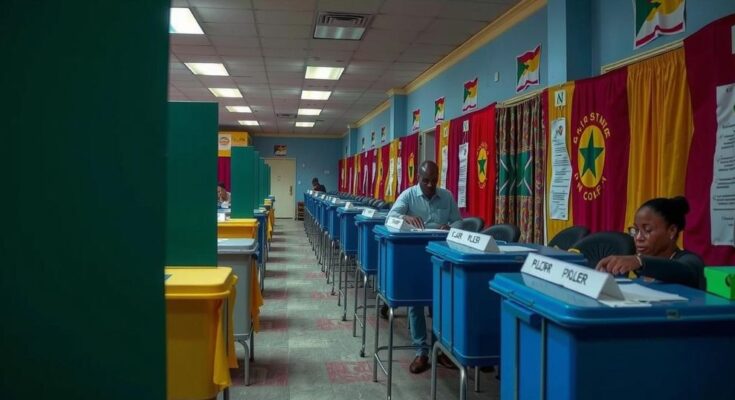Ghanaians prepare to vote for their next president amid a severe economic crisis, with current vice president Mahamudu Bawumia and former president John Mahama as frontrunners. Key issues influencing voters include high unemployment, inflation, and illegal mining. The election represents a crucial moment for Ghana’s democracy as the country seeks solutions to pressing economic challenges.
On Saturday, Ghanaians are set to participate in crucial elections to select their next president amidst challenging economic conditions, the harshest the nation has faced in decades. With twelve candidates in the running and incumbent Nana Akufo-Addo unable to seek a third term, the race is primarily between vice president Mahamudu Bawumia from the ruling New Patriotic Party (NPP) and former president John Mahama from the opposition National Democratic Congress (NDC). Polls indicate a significant division among voters regarding the two frontrunners.
Economist Godfred Bokpin emphasized the electorate’s focus on economic matters, highlighting issues such as high unemployment rates and the damaging impact of illegal gold mining operations, locally termed “galamsey.” These factors have plagued the country, contributing to environmental degradation and significant income loss in affected areas. Despite prior attempts to curtail illegal mining activities, many sites still thrive, and rising gold prices have compounded inflation and poverty challenges.
According to the Ghana Statistical Service, youth unemployment remains alarmingly high, affecting over 1.3 million individuals aged 15 to 35. Additionally, the Covid-19 pandemic has contributed to increasing poverty levels since 2020, as reported by the World Bank. The bank’s October report indicated major economic setbacks, such as limited government spending and escalating inflation, with inflation rates reaching 54.1% in December 2022.
In light of these challenges, Bawumia, who has played a prominent role in the government’s economic strategies, faces scrutiny over the nation’s economic performance. Despite previously being seen as the face of economic policy, he argues his position has been primarily advisory. Political analysts note that while Bawumia’s economic background is a double-edged sword, it significantly affects public perception as the election approaches.
Conversely, Mahama aims to restore governance focused on accountability and efficiency, emphasizing his previous successes in reducing unemployment and enhancing press freedoms during his term. He promises to tackle unemployment and illegal mining while vowing to establish a more responsive government if elected.
Bawumia’s campaign includes promises to stabilize local food prices and modernize the economy through digital advancements. With over half of Ghana’s population eligible to vote and a strong desire for change palpable, the outcome of this election is likely to be closely contested, with analysts predicting a competitive race between the leading candidates, while hopes prevail for a peaceful transition of power, respecting Ghana’s democratic traditions.
Ghana is currently facing severe economic challenges, characterized by high inflation rates, youth unemployment, and environmental degradation linked to illegal mining activities. These circumstances have arisen amidst a global surge in gold prices, which has worsened living conditions for many Ghanaians. The country is preparing for a significant presidential election with high stakes, with the ruling party’s candidates under scrutiny for their previous economic management. The elections also come on the heels of economic fallout from the COVID-19 pandemic, contributing to escalating poverty levels since 2020.
The impending elections in Ghana reflect a critical moment for its democracy amid significant economic difficulties. With economic performance at the forefront of voter concerns, both leading candidates, Mahamudu Bawumia and John Mahama, present distinct platforms and promises in response to the electorate’s demands for change. The upcoming vote will not only test the candidates’ popularity but also the resilience of Ghana’s democratic processes, with expectations for a peaceful transition of power whether in victory or defeat.
Original Source: www.cnn.com




